by Brian Hioe
語言:
English
Photo credit: Taiwan LGBT Family Rights Advocacy
On October 27th, New Bloom’s Brian Hioe interviewed Lupy Li from Taiwan LGBT Family Rights Advocacy concerning Taiwan LGBT Family Rights Advocacy’s work concerning tongzhi (LGBTQ) families in Taiwan.
This is the third of a series of interview profiles that New Bloom will be doing with Taiwanese NGOs and civil society organizations, in an effort to present a picture of Taiwanese civil society to an international audience.
Brian Hioe: My first question is how did Taiwan LGBT Family Rights Advocacy (台灣同志家庭權益促進會/TLFRA) begin and what are your activities?
Lupy Li: How did Taiwan LGBT Family Rights Advocacy begin? To go back to the very beginning, in 2004, there was an online BBS 5466 (我是拉拉站), with a message board called pridesenior (她的白髮及其他) for older tongzhi. Shaowen posted on the site asking, what are the problems facing elderly tongzhi? The idea was to read some articles and one of them was about America, about older LGBT communities in America. So we decided to meet in Taipei, in summer 2004, with everyone coming from different places. The majority of people who came to the meeting were lesbians because most of the members in the group were lesbians in the first place.
Our discussion was the beginning. After getting to know each other we thought, because what we were reading was about America, we didn’t know about Taiwan. So we worked together with the Tongzhi Hotline; they invited teachers for classes, for oral history, and to give us opportunities to interview older tongzhi. After the class, we were looking for people to interview, but it wasn’t so easy. You know Taiwan Tongzhi Hotline Association (台灣同志諮詢熱線協會) put out a book interviewing elderly tongzhi?
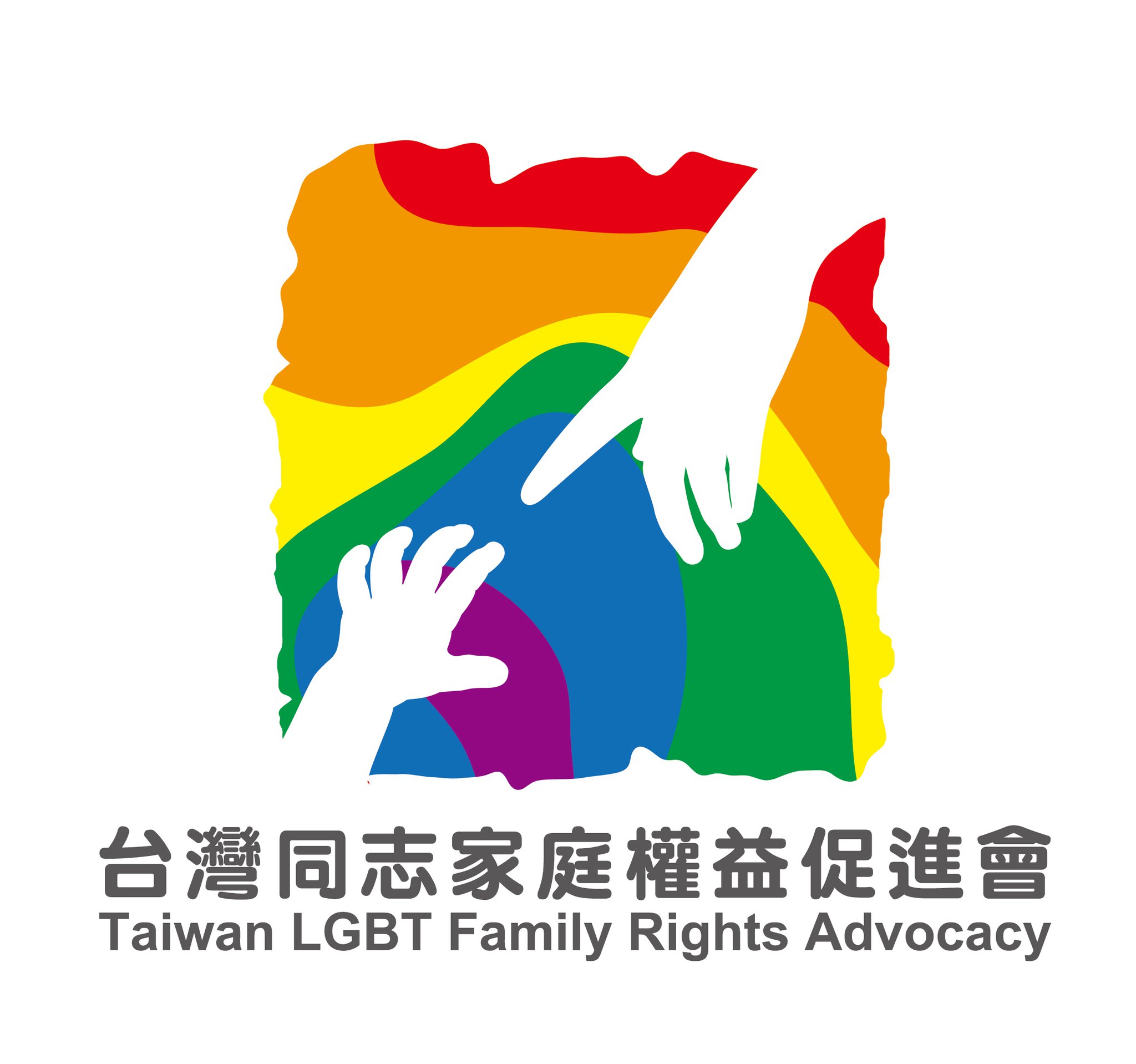 Taiwan LGBT Family Rights Advocacy logo. Photo credit: Taiwan LGBT Family Rights Advocacy
Taiwan LGBT Family Rights Advocacy logo. Photo credit: Taiwan LGBT Family Rights Advocacy
BH: I seem to recall that Jennifer mentioned it when I interviewed her.
LL: That’s related to this. Tongzhi Hotline had more male tongzhi who were willing to be interviewed, it was Hanshi (漢士三溫暖), a sauna in Taipei which introduced many people to them. As for Taiwan LGBT Family Rights Advocacy, at that time I was studying in Hsinchu, after our reading group, we created a group called 新竹老年女同志口述歷史工作小組 (“Hsinchu Elderly Female Tongzhi Oral History Group”). It was a very strong name. We wanted to find elderly women tongzhi who were willing to be interviewed.
Although we found them, there were few who were willing to be interviewed, because they weren’t willing to come out of the closest. They were afraid that after interviewing them, someone might see, because we would make it into something online and that wasn’t safe.
Later on in May 2005, I created an MSN group called the Alliance of Lesbian Mothers. If you had MSN, you could be added, and I was the moderator. So I would approve people who wanted to be added. After introducing yourself, I would add them to my MSN and ask them about where they were from, whether they were lesbian mothers, or wanted to have kids, etc. I got to know many people, so in June of that year I began to organize social events.
In the end, we decided, if we’re unable to interview older lesbians, why not interview lesbian mothers? So we put together LaMaNews (“Lesbian Mother News”). Every month, there would be an issue, in Chinese, interviewing tongzhi families, mostly from Taiwan. And with a focus on lesbian mothers. We later also interviewed gay fathers, but there were less articles, maybe two. The rest were lesbian mothers. Every month, we had a different topic.
In 2007, after many issues, one of our volunteers suggested we change our name, not just calling it “Lesbian Mothers”, but “Tongzhi Family”, to expand our focus. So we arrived at this name: “Taiwan LGBT Family Rights Advocacy.”
We didn’t apply for organizational status at that point in time until 2010. We began thinking that we should register for organizational status in 2010. In Taiwan, if you want to establish an organization, you need thirty founding members, and to be spread out across at least seven administrative areas. We were looking for founding members then. So in April 2011, we formally became an organization. That means registering with the Taiwanese government, but if you just want to begin, in reality it’s like we discussed, just starting with some people. We can also discuss, do you know 邊緣同志工作小組 (“Marginal Tongzhi Working Group”)?
BH: I don’t.
LL: In 2004 or 2005, in Tongzhi Hotline, taking classes about oral history we found some groups in different areas. There were groups carrying out similar activities across Taiwan, originally with a focus on elderly tongzhi. But because not every group could find elderly tongzhi willing to be interviewed, it ended up with different groups going in different directions. For example, in the north, there was only Tongzhi Hotline in Taipei with a focus on elderly gay men, us in Hsinchu with lesbian mothers. In Taichung, there was a teacher at Tunghai University, Professor Antonia Zhao (趙彥寧), who interviewed male tongzhi there, in regards to freedom of love. In the south, it had to do with Indigenous tongzhi, and also in the East, with Hans and Indigenous.
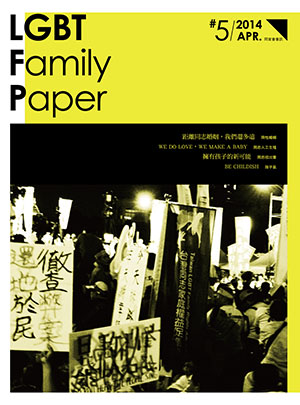 The LGBT Family Paper published by Taiwan LGBT Family Rights advocacy. Photo credit: Taiwan LGBT Family Rights Advocacy
The LGBT Family Paper published by Taiwan LGBT Family Rights advocacy. Photo credit: Taiwan LGBT Family Rights Advocacy
All these groups across Taiwan, we would having a meeting with everybody once, maybe two times a year. Now we don’t do this anymore. But 2005 to 2006, during that span of time, we would meet to discuss, in regards to experience, history, difficulties met, or interesting interviews we might have done. It was quite interesting.
With tongzhi demonstrations (pride parades) in Taiwan, on the streets, you see young and attractive tongzhi [Laughs], but it’s not just that there are only young tongzhi. There are tongzhi people who are older, whether middle-aged or elderly. Not everybody looks so good on the outside. And not everyone lives in large cities, like Taipei, they might live in more rural areas. Like Indigenous tongzhi, they might live on the mountains and go to the cities to work. In regards to what this brought to the Taiwanese tongzhi movement as a whole, you could see tongzhi coming from different perspectives and different backgrounds.
BH: I see. So can you explain some of the activities you do as an organization? We discussed LaMaNews and interviews?
LL: When we began, it was more going out and having fun within the group, and with LaMaNews we would meet once a month to decide who we wanted to interview next and what topic to do or dividing up topics or reading something and having a reading group. So we were LaMaNews editors since we would all interview people and edit for our online publication.
The editorial side was more serious, since everyone would discuss, read something and share, and decide what the next issue should be, and what the content should be. With the MSN groups, it was more everyone getting together and eating dinner, to go do something fun, or chat. Originally, it was these two aspects.
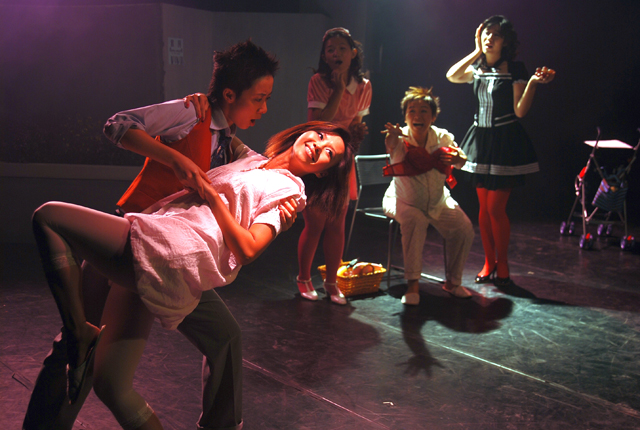 Still from 一百種回家的方法 (“One Hundred Ways to Go Home”). Photo credit: Short One Player (三缺一劇團)
Still from 一百種回家的方法 (“One Hundred Ways to Go Home”). Photo credit: Short One Player (三缺一劇團)
Later on, we looked for ways to increase the number of volunteers. For example, in 2007, there was a drama we held called 一百種回家的方法 (“One Hundred Ways to Go Home”). We worked together with Short One Player (三缺一劇團) drama troupe. The director of the drama was also a volunteer of ours. He wrote a play related to lesbian mothers. It was later published. That drama was performed in Taipei and every session there was a lot of people. After every performance, we would organize discussions with the audience, and there was an exhibition in the theater as well, with pictures, short documentaries, etc.
In 2007, we divided our volunteers into different groups, and from to when we registered in 2011, you can see the shape of our present organization. With registration you need to handle meetings and administrative, discussion and meetings.
For example, with Taiwan LGBT Family Rights Advocacy, before, we were filing litigation in regards to custody cases. You know second-parent adoption? In Taiwan, at present, tongzhi can’t marry so if two lesbians were to do artificial insemination, only the one who gives birth is legal mother, and for the other partner, legally they have no relation to the child. But a lot of times, they raise the child together, so the child has two mothers as parents.
We have a group now working on legalizing same-sex marriage and second-parent adoption. This is one part.
In the past two years, there are two female tongzhi members in Taiwan LGBT Family Rights Advocacy who are Buddhists and they had a public wedding. We got people to preside over the wedding and the international media came and reported and took photographs. It was very successful and meaningful; not only Taiwan media reported this, but to was also on the international news. CNN had an article called “Two Buddhist brides wed in Taiwan”, for example, in August of 2012.
The other is the cultural publishing group. Earlier on, LaMaNews became Rainbow Family News, because we wanted to expand our original focus. You can see it on our website, but it’s all in Chinese, there isn’t in English. The other thing they did was putting together the Tongzhi Family Picture Book, it’s like a book to tell stories to young children, with pictures and words. It’s a way both children and adults can understand. So they put that together and we would invite storytelling organizations or illustrators to come and put something like that together with interested people. In the future, we hope to publish more picture books. In Taiwan, there’s already one, called 阿肯的歡樂之家 (“Ah-Ken’s Happy Household”), which is published in Chinese.
The last group is for the LGBT family community, organizing camps, recreational activities, experiences sharing, and gathering for joining events like pride parade etc. So it’s this kind of division of labor, each group putting together different activities.
BH: The next question I want to ask is what the daily challenges you have to overcome. Such as looking for volunteers, finding donations, or continuing the work you do.
LL: I think all of them! In the present, we have to deal with expenses, for renting a workplace, for hiring workers. We have no full-time workers, only part-time. We’re not able to afford full-time staff right now. We organize events to get donations from tongzhi families or from ordinary people, and we’ve applied for funding, but it’s not a lot.
For our public discussions, such as in regards to Indigenous families, or discussing raising children, we’ve applied for funding, for example, from the 婦女權益促進發展基金會 (“Foundation for Women’s Rights Advocacy and Development”), they have funding for public discussions. So we use that kind of method to apply for some money, though it’s not a lot, for one event it might be 20,000 NT or something like that. Although it’s not a lot, at least we can put together something.
On the other side, concerning people power, in Taiwan, you can apply for funding for to supplement the salary of workers. But it’s only for special cases. When you apply on the application, you need to provide information on why you need this person for this special case. This is also another way to get funding.
And like I said, the other is fundraising. We’ve put together fundraising films and evening parties or dinner parties as fundraising, but it’s not enough! For volunteers, in the beginning they might be free, but after becoming more busy, or having kids and not being able to participate as much, may come and go. So we need to look for new volunteers. But in Taiwan, you can find volunteers, it’s more of a challenge getting them to stay and work together with the group in the long term.
In regards to maintaining our work, I mentioned the four different groups we have in the organization, who might determine the plans and yearly goals of each group. Once they have plans, we meet together and discuss and figure out expenses, budget, etc. to determine how we might get funding, how to organize, and so-and-so. If we can continue to do this, we can continue our activities.
BH: My next question is how concerning Taiwan society, what kind of problems do you face as you would explain to an international audience? Like in regards to tongzhi issues, what is specific to Taiwan. Right now we see how church groups are attempting to “defend the family” or oppose same-sex marriage. For an LGBTQ activist in America, what would you say is particular about the Taiwanese situation?
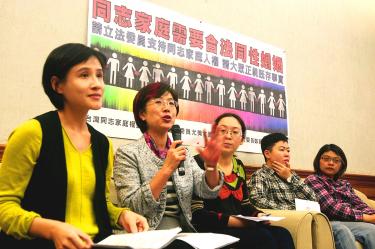 Taiwan LGBT Family Rights Advocacy deputy chairman Yu Ya-ting, third from left, at a press conference in support of same-sex marriage held on November 17, 2013. Speaking is DPP Legislator Yu Mei-nu and on far left is DPP Legislator Cheng Li-chiun. Photo credit: CNA
Taiwan LGBT Family Rights Advocacy deputy chairman Yu Ya-ting, third from left, at a press conference in support of same-sex marriage held on November 17, 2013. Speaking is DPP Legislator Yu Mei-nu and on far left is DPP Legislator Cheng Li-chiun. Photo credit: CNA
LL: In comparison to America, there are always a lot of things. Like states legalizing gay marriage and more conservative states allowing for gay marriage. So there, progress might be from state to state. In Taiwan, in the present, we need to clear three levels of consideration in the Legislative Yuan, and same-sex marriage has only cleared the first level.
Pushing for gay marriage, many groups are pushing for it with the same goal in mind. But same-sex marriage isn’t just concerning marriage, but also the family, in regards to raising children or having children. Same-sex couples still aren’t allowed to adopt children. If you’re not in a heterosexual marriage with one man and one woman, you aren’t allowed to do artificial insemination either.
In Taiwan LGBT Family Rights Advocacy, there are lesbian women who want to have kids, and there are several ways to do so. For example, finding friends willing to donate sperm, so they can do self-insemination.
If they don’t know people willing, they may have to leave the country, because Taiwan doesn’t allow for importation of sperm for use in self-insemination. If you do IVF (In Vitro Fertilization), it’s more expensive. Some people go to Thailand or America to do it. This aspect is not exactly the same as America. Artificial insemination is an issue we’re still working on. For adoption, individuals can adopt, even if you are a tongzhi, but you have to go through an evaluation in order to see if you’re suitable to raise kids. I think it’s the same in America. We’re working on this aspect. For example, if two gay men want to adopt, they can adopt individually, but not as a joint household. In regards to the law, you can adopt individually, but there’s no way to have joint adoption because tongzhi aren’t allowed to marry.
BH: What about from Taiwanese society? As in the attitudes of Taiwanese society.
LL: I think we can pull out a few examples, I would guess Tongzhi Hotline probably also brought this up. It’s been law for 8 or ten years, although putting this into effect has taken longer. For sexual education regarding tongzhi, it’s part of the curriculum for primary schools, and conservative organizations, some church groups, oppose this education. They put together two coalition groups called, 真愛聯盟 (“True Love Alliance”) and 守護家庭聯盟 (“Protect the Family Alliance”).
True Love Alliance’s stance is why do you need to teach about homosexuality to children, if you teach children about homosexuality they will come to believe it is natural, they will come to know about this stuff after they are old enough on their own. But in reality there are adolescent tongzhi and young children with different identifications, of course. Yet what is really important here is in regards to the textbook put out by the Ministry of Education is the teaching material for teachers to arrange their curriculum.
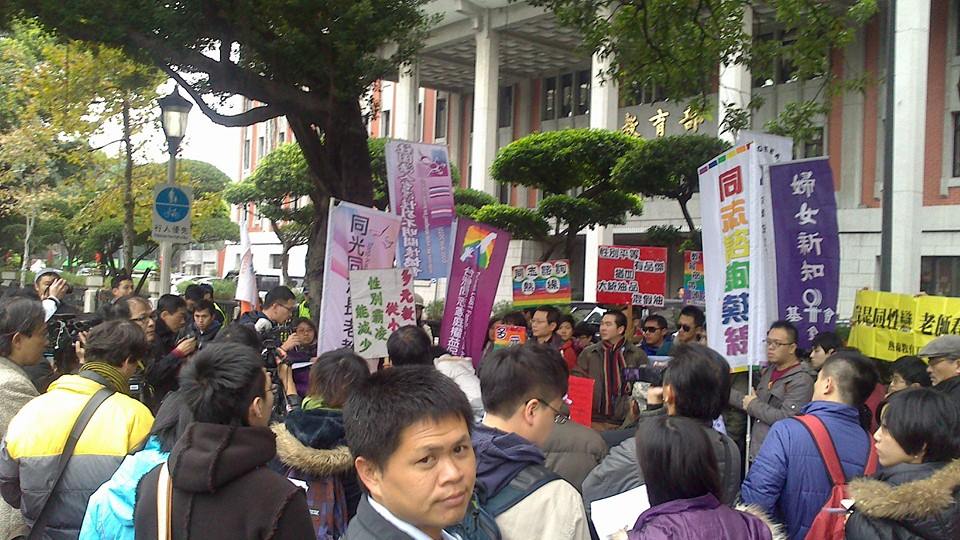 Members of Taiwan LGBT Family Rights Advocacy and other groups demonstrating outside the Ministry of Education on January 20, 2014. Photo credit: Taiwan LGBT Family Rights Advocacy
Members of Taiwan LGBT Family Rights Advocacy and other groups demonstrating outside the Ministry of Education on January 20, 2014. Photo credit: Taiwan LGBT Family Rights Advocacy
The Ministry of Education held public hearings to put together talks and discussions in different places, but there were oppositional voices, and dialogues were held, but during this point in time, we also encountered the “Protect the Family Alliance.” Their stance is marriage should be one man, one woman. One father, one mother is best for children. Their argument had the strange aspect of arguing that tongzhi families were bad, but what about single family households? Is that also bad? They shut out other forms of family.
They also said that tongzhi were minorities only, if you want to marry, we need everyone to vote and agree after a public referendum. In response, a sign at tongzhi protests asked, “You’re married. But have you asked me?” As in, for heterosexual marriages, have you asked homosexuals before? So why do I need to ask for your opinion?
For church groups they’re able mobilize strongly, because they have donations and resources, not to mention manpower. Of course, there are tongzhi who are Christian or go to church. It’s very difficult for them, since they believe in a religion, but have to constantly hear opposition. Have you heard of a group called “Exodus Global Alliance” (走出埃及)?
BH: I haven’t.
LL: Maybe it’s from America or somewhere else, I don’t know, but they believe they can “cure” homosexuality. That you can have a “normal” live and have a heterosexual marriage and things like that after going through a curing process.
BH: Oh, now I know what you’re talking about.
LL: There was a public hearing same-sex marriage in the Legislative Yuan in the past few weeks. Groups opposed to same-sex marriage were represented too. A man there said “I used to be gay. I had sex with ten different people. Seven were halfway and three were intercourse. But now I’m ‘normal.’ I have a wife and I love her very much.” He said stuff like that.
BH: There are people like that in America too.
LL: But we ask, isn’t it then that you’re bisexual? And what’s the problem with that? It’s your decision. But some church groups have this aim for converting people from gay to straight. These are the things I can think of in regards to Taiwan’s particularities. I’m sure you would hear other stories from different organizations. Because many groups encounter these problems.
BH: Right now I’m interviewing a lot of organizations, not just in regards to LGBTQ issues but in regards to nuclear energy, urban renewal, etc. Have you worked together with these organizations before?
LL: In Taiwan, for TLFRA, less so regards to formal activity, but in regards to informal activity. For example, in Taiwan LGBT Family Rights Advocacy there’s a director called Huang Hui-Chen, her mother is T [butch], so she is making a documentary film about her mother, The Priestess Walks Alone (我的T媽媽). She was originally also a volunteer in the Taiwan International Workers Association and she also made documentary films about labor issues.
Have you heard of 人民民主陣線 (People’s Democratic Front)? It’s an organization with much relation to labor. In the labor movement, tongzhi participate and in the labor issues, they might discuss how workers might express their will. For example, election is one way to get people express their demands. People’s Democratic Front fields their own candidates, some of which are tongzhi. Same with the Green Party and they have tongzhi candidates as wells. We have exchanges with them, for example, they might attend our fundraisers or our events or come to discuss with us.
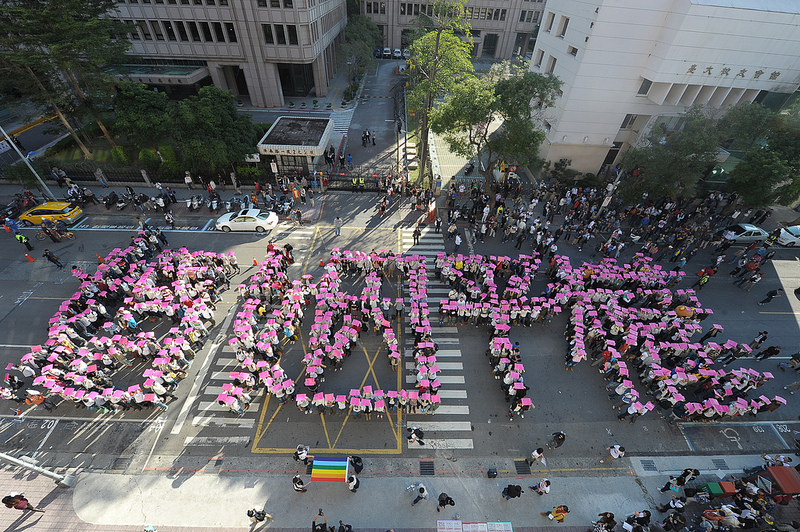 Demonstrators outside of the Legislative Yuan on September 1st, 2013. The signs being held up in the air form the words, “Marriage Equality.” Photo credit: 台灣伴侶權益推動聯盟
Demonstrators outside of the Legislative Yuan on September 1st, 2013. The signs being held up in the air form the words, “Marriage Equality.” Photo credit: 台灣伴侶權益推動聯盟
So there might not be visible formal cooperative efforts, but there are these kind of informal exchanges. Or land issues. We have a member who farms. There’s a group called Land Dyke (土拉客) that concerns itself with land issues, as in Miaoli, and with protests. People go and protest there, but not as representing themselves as tongzhi, or as part of tongzhi organizations. In regards to anti-nuclear, we’ve attended anti-nuclear events. And also the occupation of the Legislative Yuan.
BH: What would the response of Taiwan LGBT Family Rights advocacy in regards to tongzhi groups who call for the abolition of marriage be?
LL: There’s a journalist at Cooloud, who probably is also a tongzhi, but he is opposed to same-sex marriage. He looks at it from a more radical angle, he thinks that tongzhi shouldn’t advocate for same-sex marriage, but stand with straight people in calling for the abolition of same-sex marriage. But Taiwan LGBT Family Rights Advocacy’s position is to look at the present situation, that there are already tongzhi families, and there’s no way to change the laws and social environment in the short-term in order to realize an ideal society. So we believe that it’s still good to push for same-sex marriage, but that doesn’t mean that everyone needs to get married either.







